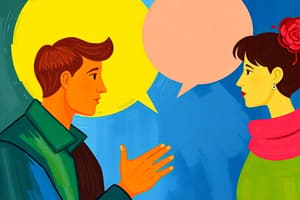Podcast
Questions and Answers
What is a common barrier to effective communication that involves premature judgments?
What is a common barrier to effective communication that involves premature judgments?
- Noise
- Poor expression
- Poor listening (correct)
- Distrust
Which aspect is NOT part of the recruiting process in Human Resource Management?
Which aspect is NOT part of the recruiting process in Human Resource Management?
- Solicited applications
- Job description
- Staff training (correct)
- Job specification
What is identified as a vital resource of any organization in Human Resource Management?
What is identified as a vital resource of any organization in Human Resource Management?
- Financial capital
- Technological resources
- Physical infrastructure
- Human capital (correct)
What step follows recruitment in the HRM process?
What step follows recruitment in the HRM process?
Which of the following is an example of an intervening variable in communication?
Which of the following is an example of an intervening variable in communication?
What type of rewards does adequate compensation include?
What type of rewards does adequate compensation include?
Which barrier to communication highlights the importance of direct interaction?
Which barrier to communication highlights the importance of direct interaction?
What best describes the process of orientation in HRM?
What best describes the process of orientation in HRM?
Which element of communication has the largest impact on how a message is interpreted?
Which element of communication has the largest impact on how a message is interpreted?
What is the main function of feedback in the communication process?
What is the main function of feedback in the communication process?
Which aspect of communication involves both verbal and non-verbal components?
Which aspect of communication involves both verbal and non-verbal components?
How much of the communication process is influenced by vocal elements?
How much of the communication process is influenced by vocal elements?
Which of the following best describes the total communication process?
Which of the following best describes the total communication process?
What does effective communication require to ensure that the message sent is received accurately?
What does effective communication require to ensure that the message sent is received accurately?
Which component of communication helps in conveying feelings and emotions during interaction?
Which component of communication helps in conveying feelings and emotions during interaction?
What process is involved in transforming thoughts and emotions into a communicable message?
What process is involved in transforming thoughts and emotions into a communicable message?
What characterizes the self-actualisation stage in Maslow's hierarchy of needs?
What characterizes the self-actualisation stage in Maslow's hierarchy of needs?
Which of the following is NOT a need associated with self-actualisation?
Which of the following is NOT a need associated with self-actualisation?
According to Theory X, how do average individuals feel about work?
According to Theory X, how do average individuals feel about work?
How does Theory Y view employee motivation in the workplace?
How does Theory Y view employee motivation in the workplace?
Which type of communication involves sending messages from upper management to lower levels?
Which type of communication involves sending messages from upper management to lower levels?
In the context of communication, what is the primary focus of upward communication?
In the context of communication, what is the primary focus of upward communication?
What is the main purpose of effective communication within an organization?
What is the main purpose of effective communication within an organization?
Which element does NOT play a role in the principles of communication?
Which element does NOT play a role in the principles of communication?
Flashcards are hidden until you start studying
Study Notes
Communication Overview
- Communication is the art of transmitting information, ideas, and attitudes between individuals.
- It is a meaningful interaction that involves changes in behavior and influences others.
- Expression of thoughts and emotions is facilitated through words and actions.
- Acts as a tool for controlling, motivating, and engaging socially and culturally.
Communication Experiences
- Involves multiple senses: hearing, seeing, touching, smelling, and tasting.
- Pharmacists use communication to interact with patients and other stakeholders effectively.
The Communication Process
- Involves a sender who encodes a message that a receiver decodes.
- Messages can be transmitted verbally, non-verbally, in written form, or pictorially.
- Feedback is a crucial aspect to ensure effective communication occurs.
Verbal Communication Dynamics
- Communication comprises 7% verbal (what is said), 38% vocal (how it is said), and 55% visual (body language and non-verbal cues).
- Effective communication hinges on the accurate encoding and decoding of messages.
Non-Verbal Communication
- Non-verbal cues convey feelings and emotions through body language, eye contact, and facial expressions.
- Paralanguage refers to how something is said, adding layers of meaning beyond words.
Self-Actualization (Maslow’s Hierarchy)
- Represents the pinnacle of Maslow's needs, focused on reaching full potential and continuous personal growth.
- Individuals in this stage prioritize morality, creativity, problem-solving, acceptance of truth, and understanding justice.
Douglas McGregor's Theories of Management
- Theory X: Assumes most people dislike work and require external control and threats to fulfill organizational objectives.
- Theory Y: Posits that work is as natural as play; individuals exhibit self-direction and motivation towards achieving goals.
Types of Communication
- Includes downward (from higher to lower levels), vertical (between different levels), and upward (from lower to higher levels) communication.
Barriers to Effective Communication
- Key barriers include lack of planning, poor listening, emotional reactions, misunderstandings, and noise.
- Effective communication may be hindered by distrust, unclarified assumptions, and breaks in communication.
Human Resource Management (HRM)
- HRM focuses on human capital and is crucial in organizational success; previously referred to as personnel management.
- Involves manpower planning to determine the necessary knowledge and skills for staffing.
HRM Processes
- Recruitment: Attracting a pool of candidates through job descriptions and specifications.
- Selection: Matching candidates with the appropriate roles within the organization.
- Placement: Assigning employees to specific positions based on their skills and qualifications.
- Orientation and Training: Providing new employees with essential information about their roles and ongoing development.
- Compensation: Offering adequate monetary and non-monetary rewards to employees for their contributions.
Studying That Suits You
Use AI to generate personalized quizzes and flashcards to suit your learning preferences.




